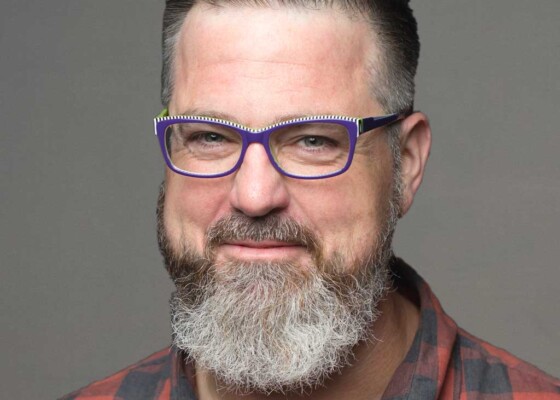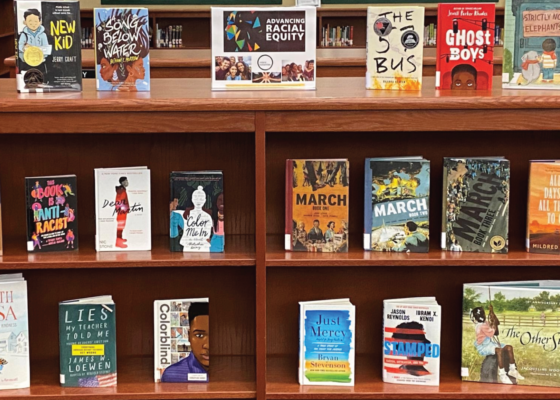Frankenstein Friday: Improvising Frankenstein: Bringing to Life New Stories of Disability
December 14, 2018This fall, I had the privilege of presenting “Improvising Frankenstein: Bringing to Life New Stories of Disability” as part of Indiana Humanities’ One State / One Story: Frankenstein celebration. I…
This fall, I had the privilege of presenting “Improvising Frankenstein: Bringing to Life New Stories of Disability” as part of Indiana Humanities’ One State / One Story: Frankenstein celebration. I traveled to libraries and schools in communities small and large – from Rockville to Indianapolis. It was a pleasure to discuss the ways that Mary Shelley’s novel reflects how we think about, respond to, and ultimately create disability as individuals and communities.
We talked about the ways in which the “monster” faced rejection by individuals that couldn’t accept the differences of his body and support his attempts to communicate and participate in community life.
“Once I falsely hoped to meet the beings who, pardoning my outward form, would love me for the excellent qualities which I was capable of bringing forth” (Shelley, 2017, pp.239-40).
We explored the idea of disability as a socially-constructed phenomenon, “not something that a person possesses but something one encounters when dealing with other people or with physical spaces that are inaccessible” (Herndl, 2005, p.593). We acknowledged that attitudes have changed over time, but challenges remain.
Many of us were uncomfortable with the term “monster,” and many felt that our communities are more accommodating of physical, intellectual, and emotional differences. Still, evidence suggests that we continue to struggle with “pardoning the outward form.” For example, Sasson and colleagues (2017) found that “typically-developing” observers had unfavorable first impressions and reduced intentions to pursue social interaction when they observed video-taped interviews of individuals with autism. However, when observers were given only written transcripts of the words used by individuals with autism, those first impressions improved considerably.
We also discussed the opposite problem of automatically viewing people with disabilities as inspirational. In a promotional video for the Indiana Governor’s Council for People with Disabilities, Katrina Gossett Kelly explains: “Having a disability does not make one inspirational. The actions one does might.” We were amazed to find this idea echoed in a 200-year-old novel.
I was impressed by how willing Indiana communities were to grapple with these complex and contradictory ideas. I was honored that so many members of various disability communities attended the presentations and lent their voices and authentic experiences to the conversations. And we had fun using improv – the art of making things up on the spot – to co-create new stories that featured people with disabilities who weren’t the objects of horror, pity, or baseless hero worship. One such story was created by a group of women who attended my presentation at the Parke County Public Library in Rockville, Indiana:
Once, there was a woman named Martha, who was blind. Every day, she went to work and took care of her family. But one day, the city eliminated the bus route that went from Martha’s home to her workplace. Because of that, she lost her job. Because of that, she couldn’t take care of her family. Because of that, her children were taken away. Finally, the community rallied and demanded that the city restore the bus route. Ever since that day, Martha has been able to go to work and take care of her family.
The participants created this story together on the spot, each person offering one line at a time. Other groups created similar stories, reflecting communities unafraid of grappling with complex ideas, communities that value compassion, hard work, and the dignity of self-determination. Even after 200 years, Frankenstein challenges us to reflect on how we respond to difference – a critical topic in today’s divided America. Improv gave us a fun and novel way to accept and support each other, and for a time, our differences seemed less likely to divide us. I’m grateful to Indiana Humanities for giving us these opportunities to reconnect.
References
Herndl, D. P. (2005). Disease versus disability: The medical humanities and disability studies. PMLA, 120(2), 593-598.
Indiana Governor’s Council for People with Disabilities. (2017, February 13). Indiana March Disability Awareness Month: I’m Not Your Inspiration, I’m Your Neighbor [Video file]. Retrieved from https://www.youtube.com/watch?v=Hie4zcFXh_Y.
Sasson, N. J., Faso, D. J., Nugent, J., Lovell, S., Kennedy, D. P., & Grossman, R. B. (2017). Neurotypical peers are less willing to interact with those with autism based on thin slice judgments. Scientific reports, 7, 40700.
Shelley, M. (2017). Frankenstein. Seattle: AmazonClassics.



